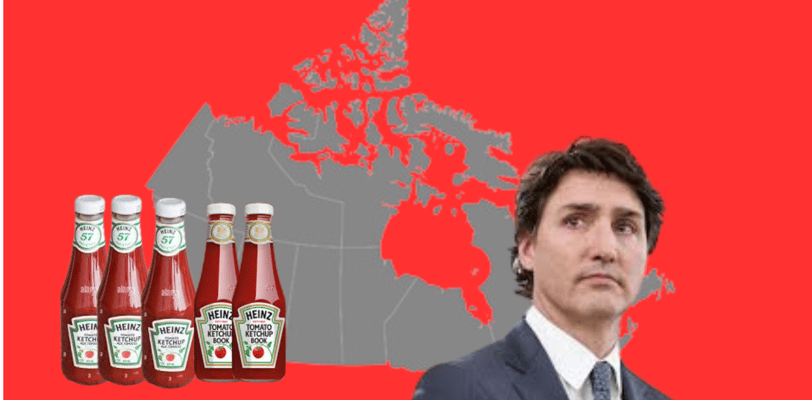Kraft Heinz Responds to Trudeau's Misleading Remarks on Canadian Ketchup
Kraft Heinz recently responded to comments by Prime Minister Justin Trudeau, calling them “misleading” after he mentioned the company’s past exit from Canada during a conversation about tariffs. In 2014, Heinz closed its Ontario plant, creating a rivalry with French’s, which continued to use Canadian tomatoes. However, in 2020, Kraft Heinz returned ketchup production to Canada, employing over 1,000 Canadians and purchasing tomatoes from Ontario. While Trudeau’s comments reflected past events, Kraft Heinz made it clear that its ketchup is now made in Canada, using local ingredients. This incident highlights the intersection of food production, national pride, and global trade politics.
CANADAUSA


Kraft Heinz Fires Back at Trudeau's 'Misleading' Comments About Canadian Ketchup
In the world of ketchup, some battles are fought not just over flavor but also over politics. Recently, Kraft Heinz, the maker of the beloved Heinz ketchup, found itself in the midst of a heated back-and-forth with none other than Canadian Prime Minister Justin Trudeau. The issue at hand? A comment made by Trudeau about Heinz's past exit from Canada and its eventual return.
The Trigger: A Comment on Trade and Tariffs
It all started with a statement Trudeau made earlier this week while discussing potential consequences of a looming trade dispute between Canada and the U.S. In his remarks, the Prime Minister encouraged Canadians to buy domestic products in anticipation of higher costs due to retaliatory tariffs. He pointed to a specific example: Heinz ketchup, which he claimed was replaced by French’s ketchup after Heinz moved its production out of Canada.
“It’s an example from last time when Heinz ketchup was replaced by French’s ketchup because French’s was still using Canadian tomatoes,” Trudeau said.
This comment didn’t sit well with Kraft Heinz, which quickly fired back. The company issued a statement on Thursday, calling the Prime Minister’s remarks “misleading.” Why? Because, as Kraft Heinz pointed out, the company has been producing ketchup in Canada for several years now.
A Trip Down Memory Lane: Heinz's Departure and Return
To understand the full picture, it’s important to take a step back in time. In 2014, Kraft Heinz made a controversial decision to close its hundred-year-old tomato processing plant in Leamington, Ontario, leaving many Canadian workers and farmers upset. For a while, Canadians could only find Heinz ketchup made in the U.S., while French’s, its primary competitor, was still producing its ketchup using Canadian-grown tomatoes. This created a rivalry that stirred up quite a bit of local sentiment.
But here’s where things get interesting: after backlash from both consumers and local tomato farmers, Kraft Heinz made the decision to return ketchup production to Canada. In 2020, the company reopened its operations, this time in Mont Royal, Quebec. Kraft Heinz is now proud to state that its ketchup is made in Canada, by Canadians, using Canadian tomatoes. The company employs over 1,000 Canadians at its Mont Royal facility and is the largest purchaser of tomatoes in Ontario.
So, when Trudeau referenced the earlier period in which Heinz wasn’t making ketchup in Canada, Kraft Heinz felt the need to correct the record.
The Power of National Pride: Ketchup and Politics
This isn’t just about ketchup—it’s about something bigger: national pride and economic policy. The relationship between Canadian consumers and their homegrown products is a sensitive one, especially when issues like trade wars and tariffs are on the table. Trudeau’s comments, while reflecting a real historical shift in ketchup production, also touch on something many Canadians care deeply about: supporting local businesses.
But for Kraft Heinz, the narrative around their ketchup needed a correction. The company wanted to make sure Canadians knew that the ketchup on their tables today is, in fact, homegrown.
It’s also an interesting moment in the ongoing debate over free trade, tariffs, and the global supply chain. With President Donald Trump threatening to impose a 25% tariff on Canadian goods in the near future, Canadian politicians have been scrambling to figure out how to respond. While the trade war remains speculative at this point, what is clear is that Canadian products—and Canadian production—are becoming a focal point in political discourse.
Expert Opinion: The Impact of the Backlash
When it comes to brand reputation, history matters. Dr. Lucy Hall, a brand strategist, commented on the situation, saying, “Companies like Kraft Heinz are acutely aware of how important it is to be seen as a responsible corporate citizen, especially in times of heightened nationalism. Their decision to return to Canada wasn’t just about economics—it was also about repairing their relationship with Canadian consumers after the 2014 plant closure.”
This situation, Hall adds, underscores the power of public perception. “When you’re a global brand, getting caught in a political crossfire can be tricky. But Kraft Heinz did the right thing by clarifying its position. Canadians want to support homegrown products, and Kraft Heinz’s commitment to Canadian production has become a point of pride for the company and its customers.”
A Nation Divided Over Ketchup?
The feud between Kraft Heinz and Trudeau is an example of how even a seemingly trivial product like ketchup can become a symbol of broader national conversations. It’s not just about who’s making the ketchup—it’s about who controls the ketchup-making process and where it comes from.
In the end, this is a story of miscommunication, market dynamics, and national pride. Kraft Heinz made its case clear: its ketchup is proudly Canadian. Trudeau’s words, while rooted in a real historical event, didn’t fully capture the company’s current situation. The back-and-forth is a reminder of how easily perceptions can shift and how important it is for brands to protect their image—especially in the face of global politics.
